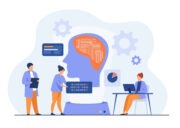
Introduction
Developers create value building software that changes the way in which people work, live, connect and all other things that humans and organizations do. This value and the capability of introducing change are not only dependent on technology itself. A great part of the value depends on HOW developers behave. This article will help you to focus on the soft skills that you probably didn’t value enough and to leverage their potential in order to become a better programmer. Understand how to foster your soft skills to become tech-savvy.
Soft skills: what are they?
Being soft-skilled means that a person is capable of leveraging their know-how to add value where they work, not only by what they do (technical skills) but how they do it (soft skills). In other words, soft skills relate to the way a person carries out their competences. They include many different kinds of abilities, but some of the most popular ones include negotiation, leadership, honesty, listening and respectfulness. We can divide soft skills into 5 categories: communication, problem solving, creativity, adaptability and work ethic.
When it comes to creating valuable solutions, tech competence is not enough. No technical solution can provide value if the person who develops it can’t assess the real problem that the solution should solve (and it’s often hard to spot the real problem starting from what customers and users ask). To fully understand the issue at hand and the needs that must be met, the person must have soft skills, like the willingness to learn, the ability to listen, be resilient and successfully network.
A solution can be technologically capturing, but it won’t be adopted if people don’t trust it. That’s where leadership, self-esteem and public speaking all come along…which are soft skills.
A great part of value in software is in its “details”. You can develop a project to be 99% perfect and not deliver value for just that 1% that lacks. Maybe it represents maintainability or robustness. But you can make up for it with soft skills. Having precision and attention to detail, the ability to troubleshoot and work well under pressure and willingness to accept feedback: any one of these can make up for the technical aspects that could be missing.
You are probably wondering how someone learns soft skills. Actually, you can’t learn them, but you can harness them. The action of learning has to do with gathering information and notions, understanding them and using them to solve problems. However, soft skills are more linked with who you are and what you feel is the right way of acting in every situation. Instead, you can learn how to make use of them.
Take a minute to reflect on which soft skills you think that you have and can improve that will help you reach your objectives. You can read books and articles, or even participate in professional workshops or seminars. Above all, you have to discover them and then try, apply and act. You can do this even by challenging yourself to do something in a new way or change your perspective, and then think about what changed.
Speaking with mentors or finding coaches that can give you constructive feedback on HOW you perform your tasks can even give you better insight on which soft skills you have to offer. Or think about someone who inspires you with how they act and apply what you observe to your own actions.
How soft skills can accelerate your career

So what does all this mean for developers? What are the most important soft skills they should have? There are a lot. Moreover, for each particular job or role, the list of which is more important also varies greatly. To give some examples, we’ve narrowed it down to listening, team work, business ethics, adaptability and critical thinking.
Listening. The ability to listen is crucial for understanding what works best to obtain customer and user objectives. There is no right direction to follow if you don’t even know where the ultimate destination is. Listening doesn’t mean being quiet or taking notes, it’s about asking the right questions, understanding what is the hidden message behind what is said, perceiving by intuition what is not said and even reading body language.
Teamwork. Software development is a complex environment, which means it requires certain skills to succeed. Teamwork is one of them. With teamwork, you can unlock new solutions collaborating with others, making 1+1 become 3 and not 2. Often companies ask for teamwork as a skill in potential candidates, and the “team” is not always a scrum team, but frequently represents other company functions like business development or customer service.
Business ethics. As a developer, you do something that often manages user or customer data. You are the only one that can prevent technical debt. Even more, sometimes you are the only one that knows exactly what’s happening inside that server. Together, successfully handling all of these responsibilities has a lot to do with being a person that can be trusted by colleagues, customers and managers for their business ethics.
Adaptability. ICT is a world that changes rapidly, really so quickly, in a blink of an eye. It is also a complex world where you often find yourself doing something you’ve never done before. Things usually change even when we are in the middle of working on them. As a colleague said some time ago: “It is like changing the engine of a F1 car while it is running, and nonetheless you have to win the race.” Being adaptable is not a plus, in an environment like this, it is a must.
Critical thinking. In a complex environment, the person that knows better about how things are going is often the one who is closest to where things happen: code is written, customers meet and so on. Being able to understand when something doesn’t work and express correctly how to find a solution is considered of great value.
How can one show a potential employer that they have these soft skills? The CV is a good opportunity. Naturally, we rarely forget to add the technology we have learned in our CV: development languages, SO, frameworks, source management software, IDE and so on. All those things are important to tell the direction in which our professional experiences have evolved. That’s WHAT we have done. But HOW have we done it?
You should always include in your CV a description of the way that you have used your competences. When presenting past experiences or projects you have worked on, add information about the soft skills you used and how those were useful to obtain results. For example, “By speaking with users to understand their needs, I proposed changes to the analysis carried out by our consultant team that led to a smooth introduction of new software”. This shows that you know how to listen, negotiate and think critically…all soft skills. Or perhaps, “I’ve worked in a context where we had access to credit card numbers” or “I worked in code refactoring to maintain application management costs at an acceptable range”. This shows that you are trustworthy and have work ethics. Or even, “During the project we needed to change from Python to Java in order to comply with a new customer policy. I was able to rapidly develop a solution to port what was developed in the new languages and valued to migrate all other customers to a new architecture with the objective of reducing maintenance cost”. This all demonstrates motivation, adaptability, resilience and organization skills. Lastly, please, remember to be concise when expressing soft skills. Get straight to the point, there’s no need to write a poem.
Although companies primarily use CVs as their source for reviewing candidates, sometimes it can be difficult to fully express on paper the soft skills you have to offer. Even better than writing on paper, diving deep into your abilities by speaking with a recruiter can make all the difference.
Specialized ICT recruiters from recruitment agencies such as Umana, can vouch your soft skills to ICT companies managers they speak with.These trained professionals meet candidates in person, through videoconferences or by phone like Umana ICT recruiters do. Recruiters have already gained trust with the hiring companies, so they can attest to your technical competence but also the soft skills, which are more difficult to verify, like motivation, teamwork and trustworthiness.
The three pillar model of Umana’s Academies
Technical and social skills should be considered equally important when applying for a new position.

This has been proven time and time again through Umana’s Academies. Academies are training courses completely financed by Umana, with the aim to train people on technologies in order to enable participants to be considered in open jobs of companies that require that competencies. Some examples about topics treated in the academies are: Java, C#.NET, Angular, React, Docker, microservices architecture and so on. Academy course arguments are made combining: Technology topics, Processes in which that competencies should be used and Soft Skills required by the role the participants will assume.
The validity of this model is granted by the fact that more than 70% of participants start a job at the end of the training course.
Let’s describe what Technolgy, Processes and Soft Skills are.
Technology, includes the hard skills that the course aims to teach participants, such as Microservices architecture, DevOps, and Angular.
Process, involves the knowledge of processes that will be enabled or enhanced by technology, representing the aim of customers. Examples of this include different kinds of modules encompassing accounting, supply chain, ITIL, insurance and sales.
Lastly, a third of the course is focused on empowering the soft skills that are important for the specific professionals we want to train, mainly developers, who need teamwork, problem solving, creativity, curiosity and critical thinking.
At Umana, soft skills are so appreciated that the most valuable Academies have Open Badge certifications to attest to the completion of dedicated training courses, like the one you’ll find here: https://bestr.it/badge/show/1892?ln=en.
Discover more about the different Academies available at https://www.umana.it/per-le-persone/campagne/trova-lavoro-con-le-academy-ict/.
Conclusion
Above all, it is important to remember that soft skills are just as important as hard skills when it comes to work performance. This means that even with technical jobs such as developers, you should take time to think about which soft skills are important for this role.
Although soft skills cannot be learned like hard skills, you can always work to improve the effectiveness of how you carry out your tasks. If you are looking to change companies or start your career path as a developer, make sure that your CV also reflects your soft skills as much as your technical competences.
You can take it one step further by speaking with Umana’s specialized ICT recruiters when searching for a new job, as they can speak with ICT company managers about your hard and soft skills better than a CV. And lastly, if you are looking to jump-start your career, Umana Academies offer a great opportunity for individuals to harness their soft skills as well as their hard skills.



